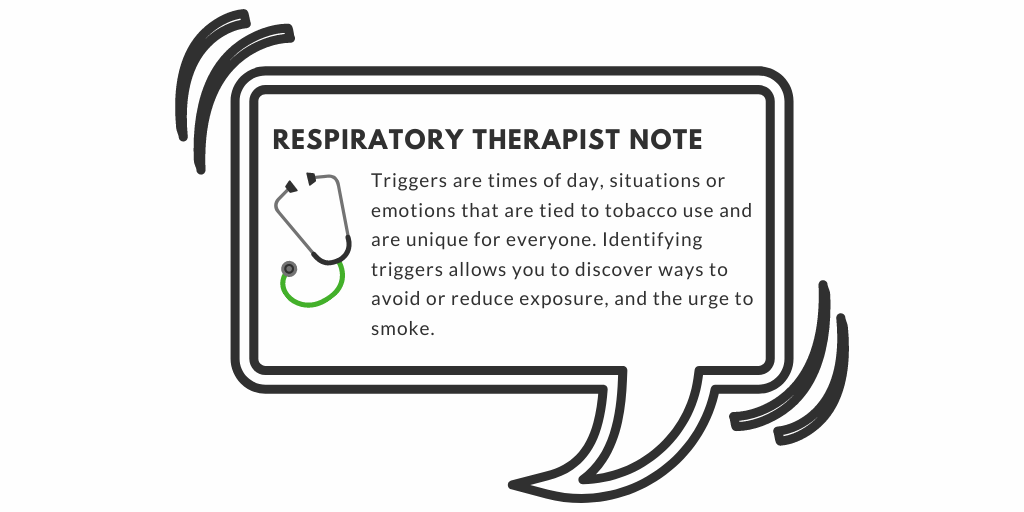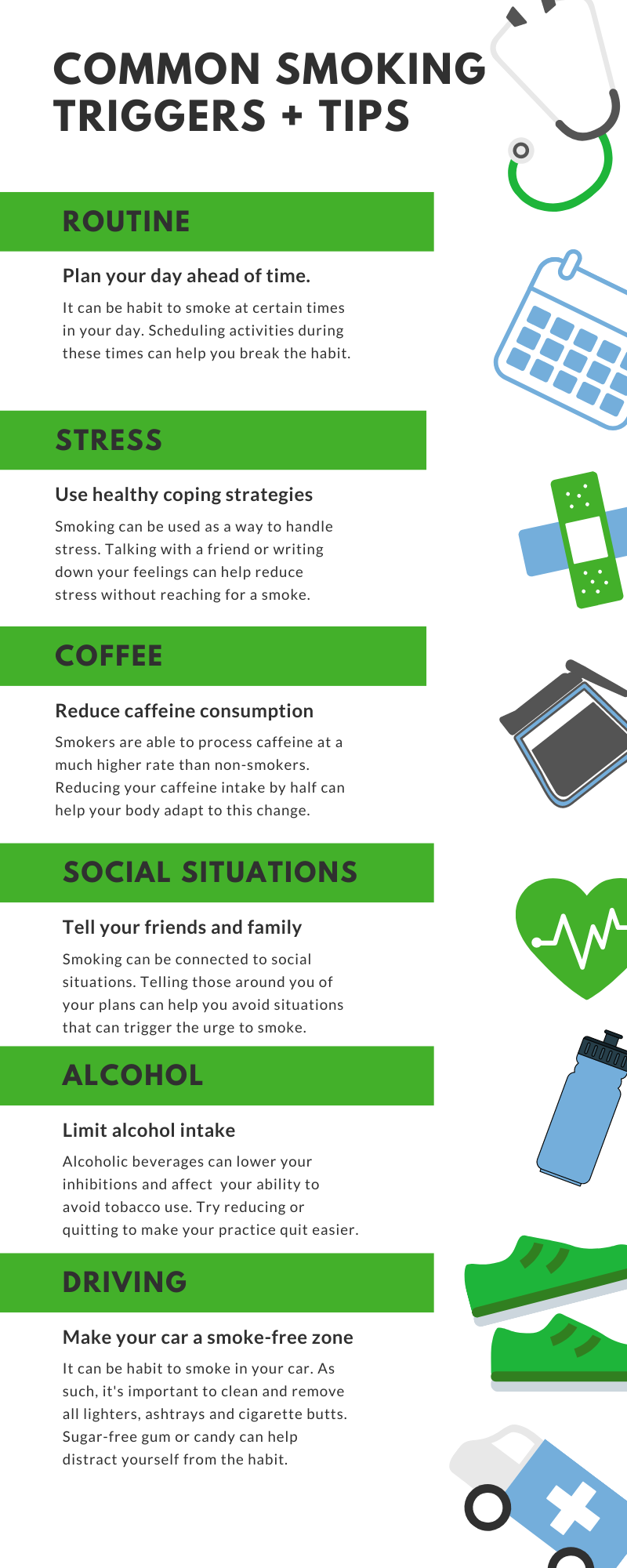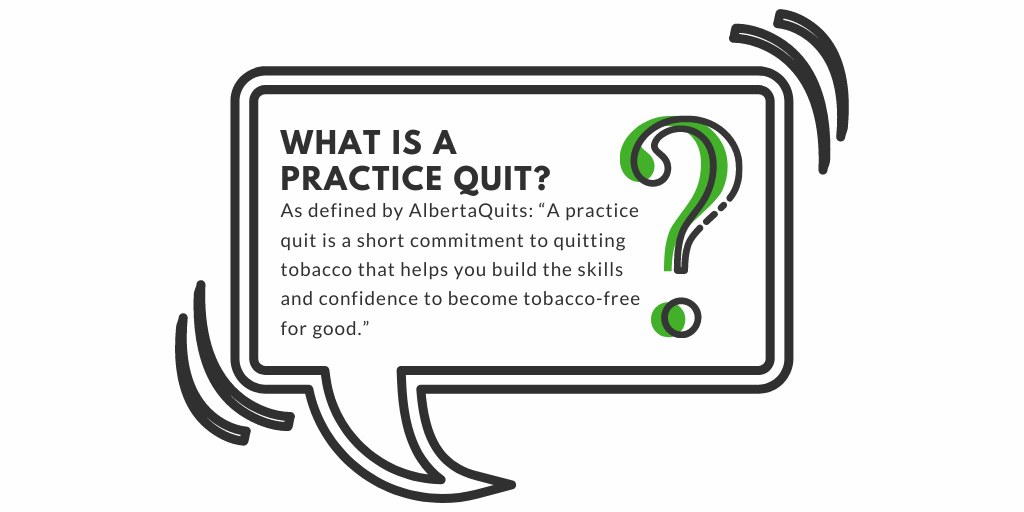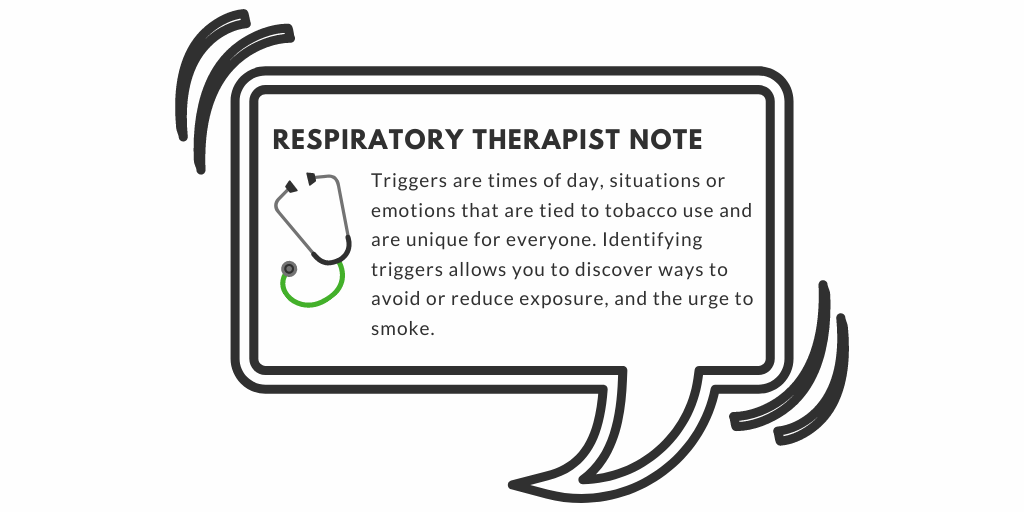By Amy Rawlinson
Registered Respiratory Therapist and Certified Respiratory Educator
The National Non-Smoking Week is the perfect time to consider your next steps in becoming tobacco free. However, with so much information and products available, the quit process can be overwhelming. A good place to start is using a Practice Quit to help develop a long term quit plan.
 Rose’s Reduce-to-Quit Plan
Rose’s Reduce-to-Quit Plan
Rose decided she wanted to change her health behaviour and reduce her smoking. Like many, she had tried quitting cold turkey in the past, but found this left her feeling stressed and eventually lead back to smoking. After meeting with a Respiratory Therapist and discussing options for smoking reduction she decided to learn more about her tobacco use by trying a practice quit.
The first step was to identify her smoking triggers!


In a journal, Rose tracked her tobacco use over the course of three days. Each time she had a cigarette she would record the time of day, situation and her mood. She’d rate her urge on a scale of one to five. A rating of one meaning she didn’t really need it and five meant she desperately needed it. When reviewing her journal, she recognized that one to two cigarettes a day were scoring low on the scale and she listed her mood as bored.
Smoking has been a big part of Rose’s life for 30 years and while tracking her tobacco use, she recognized some of her smoking came from habit. She decided to try and reduce using tobacco by one cigarette a day for three days during a practice quit.
During this time Rose found she missed the skipped cigarette. She thought of ways to keep her hands busy during periods of boredom by slicing up a fruit snack or calling a friend; however, she was surprised how difficult it was to cut out that one cigarette.

After some reflection on her practice quit and a discussion with her health care provider, she decided to try the Nicotine Replacement Therapy (NRT) Inhaler.
Rose can now confidently cut out one to two cigarettes a day with the use of NRT Inhaler and is working towards reducing even more cigarettes. Her plan is to cut out one more cigarette per day every two weeks with the help of distraction techniques and use of NRT products. She has decided her next step would be to make her car a smoke free zone.
What are the benefits of a practice quit?
A practice quit is an opportunity to:
- Try to reducing or quitting smoking for a short period (one to three days).
- Learn what challenges you may face when quitting in the future and how to overcome them.
- Ask your Doctor about prescription medications and nicotine replacement products for smoking cessation.
- Start a conversation with your health care provider about quitting and learn how they can support you.
When preparing for a Practice Quit:
- Choose a date, circle the calendar and make your commitment!
- Consider ways to beat cravings. I.e., a brisk walk
- Find a support person and/or encourage a friend to do the practice quit with you.
- Talk to your health care provider or pharmacist and purchase Nicotine Replacement Products (NRT) i.e. the Patch, Gum etc., or prescription medications such as Champix.

The Practice Quit:
- Use a journal or mobile app to record cravings, moods, and challenges during your practice quit.
- Remember the 4 D’s – Deep breathing, Delay, Drink water, Do something.
- Reward yourself!
- Utilize AlbertaQuits.ca resources for support.
- Use The Quit Calculator to keep track of money saved.
- Get active, increased activity can reduce your cravings and boost your mood.
Congratulations! You’ve had a practice quit that has helped prepare you to take your next step in reducing and quitting smoking. Whether you reduced your tobacco use, fully quit or had difficulty staying on track you have learned valuable information to fuel your next quit.
For ideas on quitting or simply staying on track ask your physician for a referral to a Respiratory Therapist at the Edmonton Southside PCN and access AlbertaQuits for more information.
Additional resources: The Lung Association, Go Smoke Free and Crush the Crave
Are you a current or ex-smoker? Use the Canadian Lung Health Test below to see if you should talk to your doctor about taking a spirometry test.



